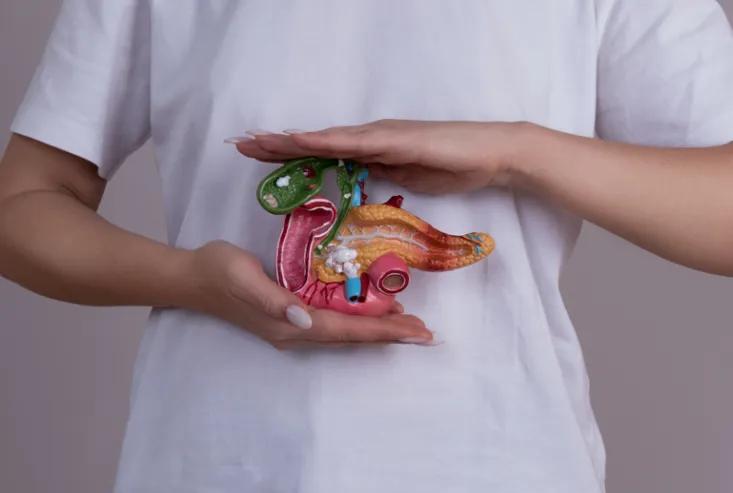While anyone can be diagnosed with pancreatic cancer, research has identified several factors that may increase the risk. Understanding these risks empowers individuals to have informed conversations with their doctors and advocate for earlier diagnosis and preventative care.
Pancreatic cancer is due to complex changes in your genes that have arisen over time or may be rarely inherited.
Doctors and scientists don’t yet know the exact causes of pancreatic cancer. Many people who develop pancreatic cancer won’t have any risk factors, while other people with some or all the risk factors may never develop pancreatic cancer. There is still a lot to learn about this disease.
The following risk factors may be associated with pancreatic cancer:
Risk factors are anything that increases the chance you may get a disease such as pancreatic cancer. It doesn’t mean that everyone who has these risk factors will get pancreatic cancer or that everyone who gets pancreatic cancer has one or more of these.

Family history
A family history of pancreatic cancer can increase a person's likelihood of being diagnosed. If you have a first-degree relative — such as a parent, sibling or child — who has had pancreatic cancer, your risk may be higher than average. This is especially important when multiple family members have been affected or if they were diagnosed at a younger age.
While most cases occur sporadically, identifying familial patterns can help guide decisions around surveillance and genetic counselling.
Lifetime risk of a pancreatic cancer diagnosis by age 80:
-
The general population has about a 1.3% lifetime risk
-
If you have one first-degree relative with pancreatic cancer, the lifetime risk is 4%.
-
If you have two first-degree relatives with pancreatic cancer, the lifetime risk is 8–12%.
-
If you have three first-degree relatives with pancreatic cancer, the lifetime risk is 16–30%.

Inherited genetic mutation
Sometimes a gene fault (called a “genetic mutation”) is identified as the reason certain families are more prone to pancreatic cancer. If someone has one of these mutations, their close relatives (such as children or siblings) have a 50% chance of inheriting the same faulty gene.
Having a family history of pancreatic cancer, or an inherited gene change, does not mean that you or your relatives will develop pancreatic cancer.
For more information about family history and genetic testing for pancreatic cancer, speak to your GP who may organise a referral to a Family Cancer Clinic. There, you can speak to a genetic counsellor about your risk and potentially take proactive steps — a key part of giving people a fair chance.

Diabetes
The relationship between diabetes mellitus (diabetes) and pancreatic cancer is complex. Several studies show that having long-standing diabetes is a risk factor for pancreatic cancer. It has also been shown that developing unexplained diabetes after the age of 50 may be an early symptom of pancreatic cancer. The vast majority of people who develop diabetes will not develop pancreatic cancer.

Pancreatitis
Pancreatitis is an inflammation of the pancreas, which can be sudden and severe or chronic (ongoing). People living with chronic pancreatitis, especially if it’s hereditary, face a significantly higher risk of developing pancreatic cancer. Inflammation of the pancreas over time may lead to changes in the pancreatic tissue, increasing cancer risk. There are many causes of pancreatitis, more commonly the chronic consumption of alcohol, various medications, or gall stones causing irritation or blockage of the pancreatic duct.
Clinical history and examination by a doctor, a blood test and appropriate radiological imaging can indicate if someone is suffering from pancreatitis.

Smoking and Alcohol
Pancreatic cancer risk is significantly increased by smoking cigarettes, cigars and pipes, as well as chewing tobacco. A recent study showed that 28% of pancreatic ductal adenocarcinoma in Australia is smoking related. Smokers are about twice as likely to develop pancreatic cancer as those that don’t smoke. Contact Quitline for information and support to help you stop smoking.
Some research suggests a link between heavy alcohol use and an increased risk of pancreatic cancer. The risk is higher for those that consume more than three alcoholic drinks a day compared to those who do not.
The good news? Quitting smoking and moderating alcohol intake can significantly reduce your risk. These are changes within reach, and they matter.

Obesity, Diet and Environment
Obesity and being overweight have also been linked to pancreatic cancer risk. It’s thought this may be because the pancreas makes more insulin in people who are overweight.
Some research suggests a possible link between pancreatic cancer and eating lots of red or processed meat and not enough fresh fruit and vegetables.
Being physically active might protect against pancreatic cancer. But this is not completely clear.
Being continuously exposed to certain workplace chemicals or other substances may increase your risk of developing pancreatic cancer. These include pesticides, dyes and chemicals used in metal refining.

Race and Ethnicity
Some ethnic groups — including African Americans, Asians and Pacific Islanders and Ashkenazi Jews populations have a slightly higher incidence of pancreatic cancer when compared with individuals of Asian, Hispanic or Caucasian descent. This is in part due to their genetic risk and also lifestyle factors.
No community should be left behind. We’re fighting to ensure everyone has access to early detection and support, regardless of background.

Age
Pancreatic cancer is more common in older people. The average age at diagnosis is 70 years, with 8 out of 10 people in Australia being over 60 years of age at diagnosis. Pancreatic cancer is rare in people under 40 years old.
While we cannot change our age, awareness increases our ability to act. Older adults should feel empowered to seek medical attention for persistent symptoms like unexplained weight loss, jaundice, or abdominal pain.

